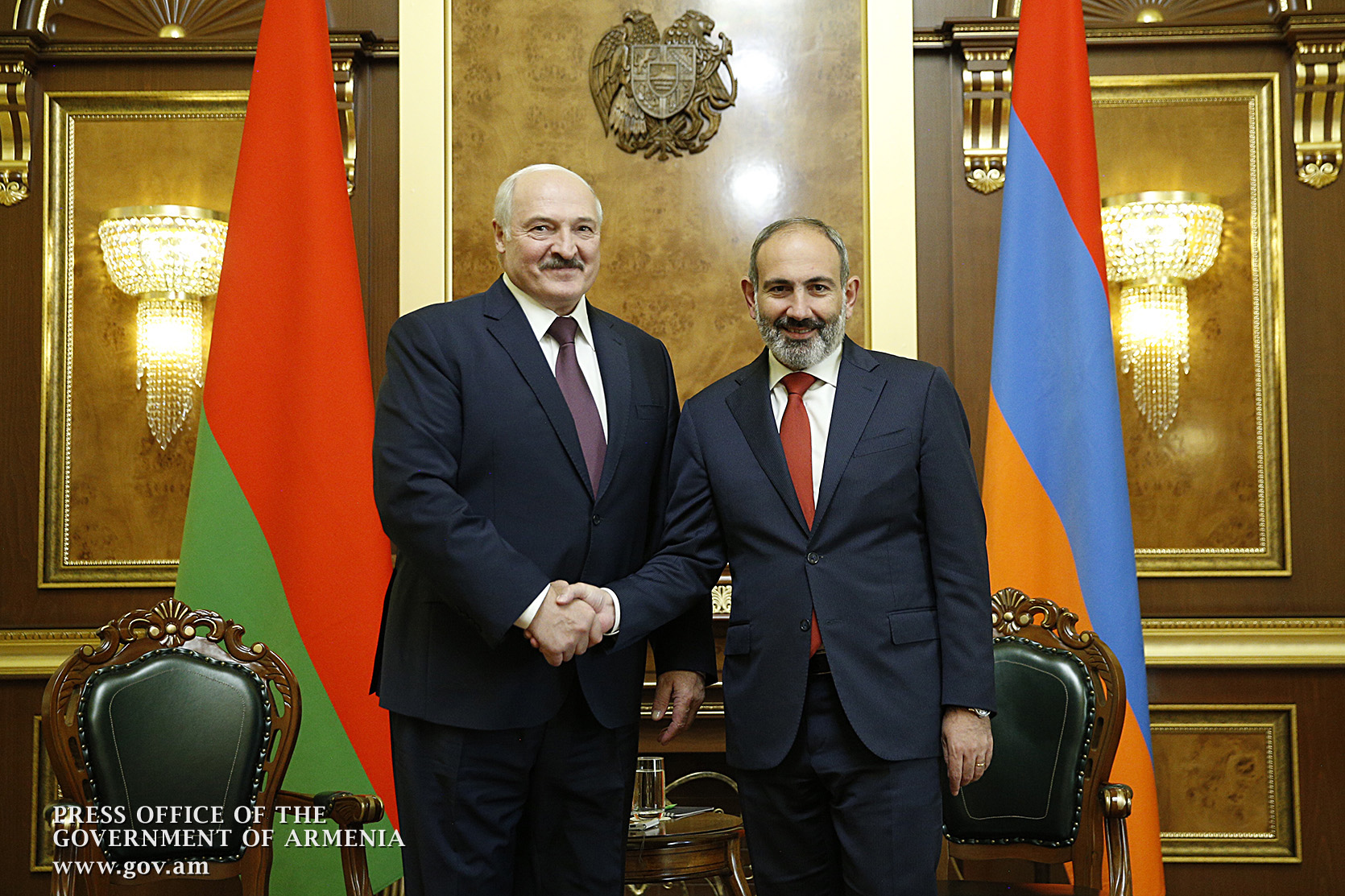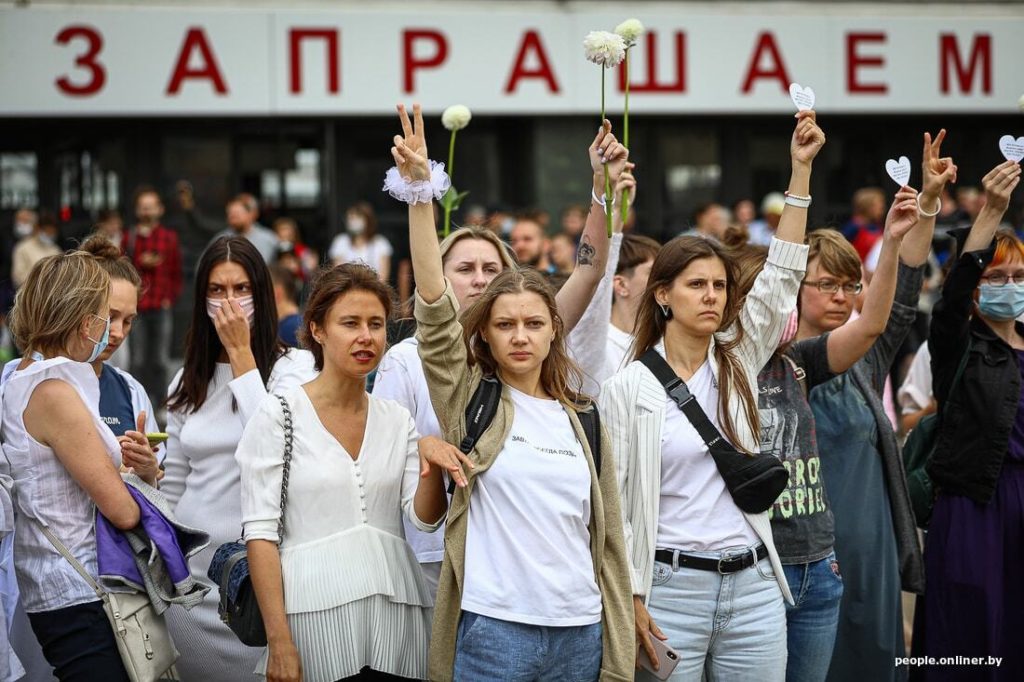
The succession of congratulatory messages from foreign leaders which started pouring in on Monday, following Belarusian dictator Alexander Lukashenko’s sham election read like a who’s who list of post-Soviet autocrats. Praises from Russia’s Vladimir Putin, Kazakhstan’s Nursultan Nazarbayev, Azerbaijan’s Ilham Aliyev, Uzbekistan’s Shavkat Mirziyoyev, Tajikistan’s Emomali Rahmon—together known as “the immortals” for their long-lived grips on power in the most undemocratic corners of the former Soviet space—were no surprise.
But the update that did dumbfound me—and provoked the ire of many Armenians—was the news that a congratulatory telegram from Nikol Pashinyan had somehow made its way into the pile of dictator back-slapping messages.
In the days leading up to Sunday’s election, where the autocrat at the helm of ‘Europe’s last dictatorship’ handed himself a sixth term in office by an astonishingly implausible—yet thoroughly unsurprising—‘landslide,’ Eurasia observers and political analysts alike were debating whether the Belarusian people would or could repeat the success of Armenia’s Velvet Revolution just two years earlier. Weary Belarusian authorities Apparently shared the same concern. As the Minsk-based journalist Franak Viacorka pointed out, pro-Lukashenko ads widely diffused before the vote explicitly warned against an Armenian-style uprising, with a voiceover superimposed onto footage of civil unrest falsely attributed to Yerevan.
And yet, within hours of the almost-comically fraudulent election results being announced, the latest poster child for peaceful reform and democratic transition in the former Soviet space added his name to that of the other jurassic autocrats. The man who 12 years earlier had been himself the victim of post-electoral repression, congratulated while the rest of Europe condemned. That telegram may as well have been a punch in the gut of every Armenian who campaigned for democratic reform, as well as to the millions of Belarusians who had come to look to Armenia for inspiration. Armenians on social media even initiated a virtual flashmob, using the hashtag “#իմանունիցչշնորհավորել” (Don’t congratulate in my name). “I don’t understand how you would congratulate Lukashenko, who kills his own people,” one Belarusian-Armenian friend posted on Facebook. “Mr. Pashinyan, isn’t this what we fought against?”

Indeed, it’s easy to forget that among the millions of Belarusians under the jackboots and truncheons—both literal and metaphorical—of Lukashenko’s hopelessly obsolete communist regime are from the country’s 25-thousand strong Armenian community. Prominent Armenian Levon Khalatryan, an active member in now-jailed opposition candidate Victor Babariko’s campaign, has been kidnapped. He is a father of one. Khalatryan has likely suffered the same fate as countless other Belarusians, like my friend Piotr Markiełaŭ, who only contacted me this morning when the internet blackout in his country was lifted. He had spent 12 days in an undisclosed prison. “I need to get some sleep” is what he wrote to me after being released.
But a couple days have passed since that telegram was received in Minsk—enough time for the pain to subside and to process. Some dismissed the telegram as a necessary part of diplomatic protocol, meant to retain cordial relations with a state which participates in many of the same international projects of which Armenia is a member and thus “avoid Armenia’s diplomatic isolation in the region” as one friend commented on Twitter.
But just what diplomatic relationship are we trying to resuscitate here? Despite common membership in the Eurasian Economic Union, the share of bilateral trade between Armenia and Belarus is so negligible that it’s lower than the UAE’s. Our alliance as part of the Collective Security Treaty Organization has done little to prevent Lukashenko from supporting Azerbaijan’s aggressive behavior both on the diplomatic front and the battlefield with the transfer of Polonez Multiple Launch Rocket Systems to Baku.
Since the 2018 Velvet Revolution, Lukashenko has continuously and publicly criticized the Pashinyan administration and openly supported disgraced oligarch and convicted rapist Gagik Tsarukyan—a longtime friend of his.
Another possible motivation for the telegram could be pure old-fashioned Realpolitik. The move goes to show, as Dr. Kevork Oskanian, an Honorary Research Fellow at the University of Birmingham observed about Armenia’s precarious geopolitical position: “Small, uncomfortably ensconced states without liberal great-power allies can’t afford the luxury of liberal, activist foreign policies.” Indeed, one of the conditions for Moscow’s non-interference in the peaceful transition of power that occurred in 2018 was a pledge not to ‘export’ the Velvet Revolution to the other corners of Russia’s “near-abroad.”
But the most likely explanation is probably much more mundane than that. In response to the public outcry, Deputy Speaker Alen Simonyan walked back the telegram somewhat, pointing out that in 2008 many Western states issued congratulatory messages to then-president elect Serzh Sargsyan as a matter of diplomatic protocol despite ongoing bloodshed. This explanation was parroted by other high ranking Armenian officials as well. Anush Begloyan, who sits on the Parliamentary Foreign Affairs Committee, said that while she’s certain that all Armenians stand in solidarity with the people of Belarus, “the actions of the Armenian Prime Minister must be guided by the diplomatic interests of the Armenian State.”
Indeed, Pashinyan’s office has a consistent record of congratulating post-Soviet autocrats and democrats alike on a variety of occasions, including Russian President Vladimir Putin on his constitution-defying electoral victory, and even Lukashenko himself on Belarusian Independence Day.
Still, one aspect of the CongratuGate (yeah, I coined it) controversy that does not make it into the discourse is the nature of the message itself. Azeri petrodictator Ilham Aliyev personally phoned Lukashenko to applaud his “convincing victory.” Accolades from Moscow hailed the vote as a “victory of wisdom and common sense of the Belarusian people over the destructive forces.” Putin publicly expressed hope for greater integration with “brotherly Russia.”
By contrast, Pashinyan’s telegram, merely wishing the Belarusian people good health and hope to “enhance the mutually beneficial cooperation between [the] two countries” almost reads like the result of an afterthought hastily assembled from a template by staffers…because it probably was. The message was almost certainly pulled from a generic template with Lukashenko’s name, that of his country and the date added in an exercise of “fill in the blank.” Compare to other similar congratulatory telegrams issued by his office before:
Thus, while the only likely real fallout will be a slight loss of face in the eyes of democracy activists, it appears that Pashinyan may be regretting the gesture anyway. It’s encouraging that at least one high ranking government has publicly expressed concern over the excessively sadistic repression of pro-democracy activists in 25 cities across Belarus. “Violence against peaceful protesters is unacceptable and deserves strong condemnation,” Simonyan reportedly told reporters on Wednesday. While Pashinyan can’t retract his congratulations, he could repair some of the damage by adding his voice to that of his deputy and strongly condemn the murderous crackdown unfolding in Belarus.
In the meantime, the Belarusian people need to know that there are many in Armenia who are following their plight with a weave of great concern, enthusiasm and passion. We share your pain, admire your courage and embrace your desire to live free. Жыве Беларусь

Author’s note: I would like to extend my gratitude to the members of the Belarusian-Armenian community and other Belarusian friends for contributing to this article whose names I cannot publish for fear of retaliation against them and their families.


Good arguments, Raffi!
It is good to be loyal to one’s friends, like you are.